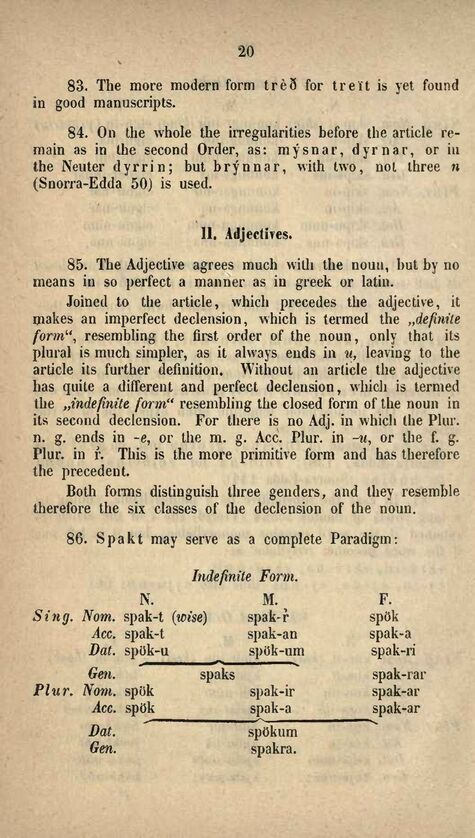
Full resolution (JPEG) - On this page / på denna sida - Part I - Inflection of Words - Declension of Nouns with the Article - II. Adjectives

<< prev. page << föreg. sida << >> nästa sida >> next page >>
Below is the raw OCR text
from the above scanned image.
Do you see an error? Proofread the page now!
Här nedan syns maskintolkade texten från faksimilbilden ovan.
Ser du något fel? Korrekturläs sidan nu!
This page has been proofread at least once.
(diff)
(history)
Denna sida har korrekturlästs minst en gång.
(skillnad)
(historik)
83. The more modern form trèð for treït is yet found
in good manuscripts.
84. On the whole the irregularities before the article
remain as in the second Order, as: mýsnar, dyrnar, or in
the Neuter dyrrin; but brýnnar, with two, not three n
(Snorra-Edda 50) is used.
II. Adjectives.
85. The Adjective agrees much with the noun, but by no
means in so perfect a manner as in greek or latin.
Joined to the article, which precedes the adjective, it
makes an imperfect declension, which is termed the „definite
form“, resembling the first order of the noun, only that its
plural is much simpler, as it always ends in u, leaving to the
article its further definition. Without an article the adjective
has quite a different and perfect declension, which is termed
the „indefinite form“ resembling the closed form of the noun in
its second declension. For there is no Adj. in which the Plur.
n. g. ends in -e, or the m. g. Acc. Plur. in -u, or the f. g.
Plur. in r̓ [[** sic, ikke i kursiv: ingen kursiv i dansk!! **]]. This is the more primitive form and has therefore
the precedent.
Both forms distinguish three genders, and they resemble
therefore the six classes of the declension of the noun.
86. Spakt may serve as a complete Paradigm:
| Indefinite Form. | ||||
| N. | M. | F. | ||
| Sing. | Nom. | spak-t (wise) | spak-r̓ | spök |
| Acc. | spak-t | spak-an | spak-a | |
| Dat. | spök-u | spök-um | spak-ri | |
| ⏞ | ||||
| Gen. | spaks | spak-rar | ||
| Plur. | Nom. | spök | spak-ir | spak-ar |
| Acc. | spök | spak-a | spak-ar | |
| ⏞ | ||||
| Dat. | spökum | |||
| Gen. | spakra. | |||
<< prev. page << föreg. sida << >> nästa sida >> next page >>